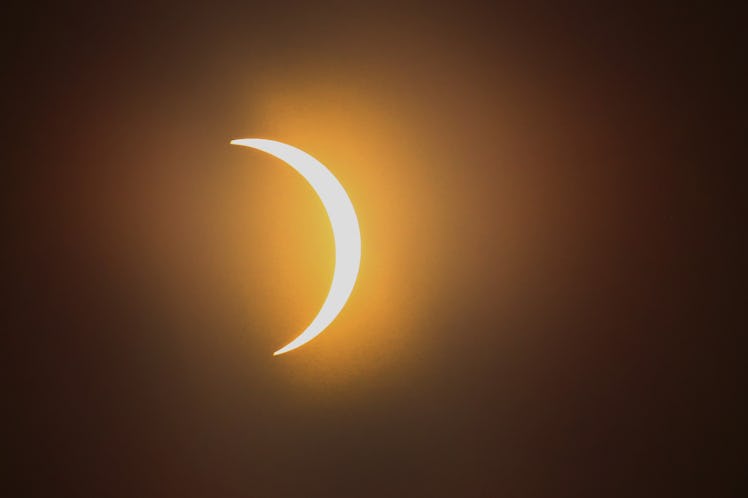
Here's How Long The Partial Solar Eclipse Will Last, So You Can Make Sure To Catch A Glimpse
There's something undoubtedly mystical about a solar eclipse. As darkness cuts through the sunlight, casting a shadow across our world in the middle of the day, you can't help but feel moved by such a strange phenomenon. If you're as obsessed with the cosmic events that take place in our sky as I am, you're probably already aware that on July 12, 2018, a partial solar eclipse is slated to occur. While this inevitably means that the effects won't be anywhere near as dramatic as a total solar eclipse, there is still plenty of wonder to go around. In fact, you might already be wondering how long does the partial solar eclipse last?
If you don't know what a partial solar eclipse is, it's when the moon obscures all or part of the sun from our view on Earth. While a lunar eclipse always takes place on the full moon, a solar eclipse can only occur on a new moon, when the sun, moon, and Earth are all aligned. The reason why a solar eclipse doesn't take place during every single new moon is that the moon follows it's own orbit that is separate from Earth's. However, once in a while, a new moon will close in on the Earth's plane of the ecliptic (aka the official title for Earth's orbit), producing a mysterious yet fascinating solar eclipse.
According to EarthSky.org, one eclipse never happens without another one taking place soon after. For example, only a couple of weeks after the partial solar eclipse on July 12, a total lunar eclipse will also take place on July 27, 2018. The period between a solar eclipse and a lunar eclipse is known as an "eclipse season." Occasionally, a third eclipse will sometimes even squeeze itself into the mix. In new age and astrological crowds, an eclipse season is a period of immense transformation and change. But more on that later.
In New York, the upcoming partial solar eclipse will begin at 9:48 p.m. EST, according to TimeAndDate.com. The fullest point of the eclipse will land at 11:01 p.m. EST, with the entirety of it concluding at 12:13 a.m. EST.
Although you'd think that two and a half hours would be plenty of time to watch the astronomical event, chances are you won't even be able to see it. Taking place where it's only in view near the most southern and northern latitudes, only a small portion of the world will be able to revel in the daytime darkness. In fact, a few of the most populated areas who will be able to actually see the partial solar eclipse take place are Adelaide and Melbourne, Australia, according to TimeAndDate.com.
Although this partial solar eclipse entails a rather exclusive viewing party, you will still be able to feel its mystifying effects from deep within your soul, no matter where in the world you are. Astrologers and spiritualists alike consider an eclipse to be a climactic tipping point in our journey through the cosmos. While a lunar eclipse signifies a dramatic ending to a chapter in your life, a solar eclipse brings a revitalizing new beginning into your world.
Taking place on a new moon in Cancer, this partial solar eclipse is bound to accentuate the spiritually cleansing effects of its intuitive and sensitive energy. Cancer, a cardinal water sign, puts you right in the center of your emotional core, making you soft and receptive to even the most subtle of vibrations. However, this emotional awareness must not be mistaken for stagnancy. You will experience a galvanizing shift emanating from the deepest workings of your soul. Since every single action must initially take root in the heart, the changes that will take place on this partial solar eclipse will be beyond meaningful.